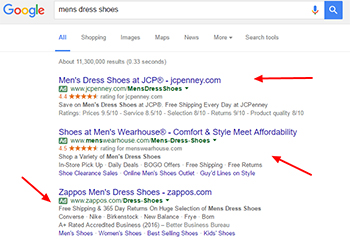Google AdWords is the most widely used Pay-Per-Click advertising platform in the digital world and accounts for about 90% of Google’s revenue. If you’ve ever used Google, you know what they look like:

Overall, AdWords is an excellent tool to sell your product, increase store visits, or gather high value leads. Here are the basics.
How it Works
The overall concept is pretty basic:
1: You choose keywords and search queries that people use to look for the stuff you sell.
If you sell shoes, then you want to target keywords like “shoes, buy shoes online, shoes for sale, shoe stores, etc.” AdWords has a Keyword Planner tool that helps you determine which words people are actually using. Do the smart thing and use it.
2: You build ads around those keywords.
You’re limited in how much you can say, so you need to make it pop. The most important thing to remember when creating ads is that AdWords is what we call “active advertising”, which means you’re making a deliberate, purposeful attempt to sell something. You don’t have time to waste being cute. Your ad needs to tell people exactly why they should buy your product or service. Luckily, Google actually wants you to be successful so they can keep making $60+ billion a year, which is why they provide some solid tips on writing a good ad.
3: You bid on the keywords for visibility.
Google AdWords is an auction. If 10 people are targeting the same keyword, obviously not everyone can have the top spot on the search results. So Google makes you compete for visibility like some sort of digital gladiator.

(Sort of like this)
The amount you’re willing to pay per click determines how competitive your campaign will be. The content and relevancy of your ad & landing page play a big role as well, but more so in the actual success of your ad (aka, your conversions and ROI). So in order for people to even see your ad, you gotta make with the Benjamins.
Our recommended ad budget: No less than $500 a month.
5 Pros of Google AdWords
1: There are over 8 billion Google searches a day.
Translation: There are a bunch of potential customers using Google.
2: Fastest way to get to the top of the SERP.
This is especially true considering that Google has added about a gazillion new ways to rank via SEO. Also, the top 3 paid ad scoop up about 46% clicks on a page.
3: Drives in-store traffic
In May of 2016, Google measured over 1 billion store visits, globally, that came from ads. Meaning someone saw an ad on a Google SERP and visited the actual brick and mortar store.
4: You address the immediate need of the user
Going back to the whole “active advertising” thing, there’s no dilly-dallying with AdWords. It’s straight to business. The consumer goes to Google to search for “men’s dress shoes”, and BAM, up pops your ad for shoes.
5: Targeting and Re-Targeting
You can target consumers by their geographic location, or you can upload your email list to the dashboard and deliver your ads specifically to those people when they login to Google. You can also retarget past conversions or those who have visited your website.
3 Cons of Google AdWords
1: Competition
Google AdWords is hella competitive, which can drive up the cost-per-click and put ranking out of reach for those with smaller budgets. Also, if your ad isn’t sitting at the top spot, the chances of someone clicking drop by almost half.
2: You can waste a bunch of money really fast
PPC works by charging you every time someone clicks on your ad whether someone buys your product or not. You cannot approach AdWords all willy-nilly. You *have* to have a good strategy.
3: When the ads go away, you go away
Your ads only run for as long as you pay for them. When the money is gone, you disappear. If you want a long term solution for ranking on Google, you need focus on SEO.
But Does It Actually Work?
Yes. Again, roughtly 90% of Google’s revenue relies on ads, so it *has* to work. How else are they going to keep the lights on at that nation-state they call their headquarters?
The question is not whether or not it works, but whether or not you can make it work for you. Some businesses certainly have better luck than others. For example, B2C companies in the financial, real estate, consumer services, and legal industires all boast high conversion rates. That said, with the right strategy, a decent budget, and a dash of sweat equity, almost anyone can find success with AdWords.
Feel like giving AdWords a real shot? Give us a call and we’ll help you do it.


